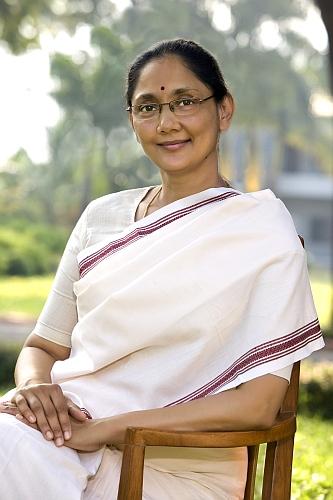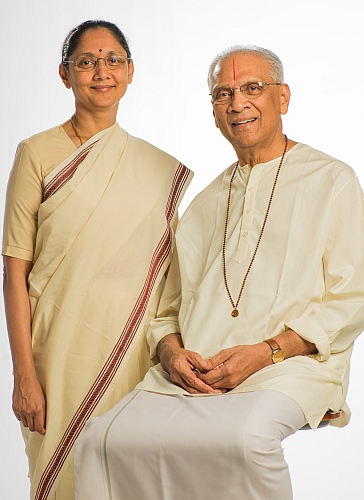
Sunanda Leelaram has dedicated her life to teach Vedanta, a body of knowledge that expounds the technique of life and living.
Better known as Sunandaji, she has addressed diverse audiences across four continents for over two decades. She is a senior administrator and trustee of the Vedanta Cultural Foundation, dedicated to the study, research and propagation of Vedanta, situated in the Malavli Hills, some 101 kilometres from Mumbai.
Sunandaji runs the foundation with her father Swami Parthasarathy and her son Swami.
Rediff.com's Arthur J Pais spoke to Sunandaji, who is currently on a multi-city North American tour.
There have been many scandals involving gurus in the past years. What are your thoughts on gurus who betray the scriptures and the followers?
Lord Buddha warned thousands of years ago against following a teacher just because others were doing so.
We should ask ourselves if a teacher is conducting his or her life per the scriptures and is well-versed in them. We should always ask questions.
When did you begin asking questions?
Right from my childhood. I am the only child of Swamiji (Swami Parthasarathy) who was encouraged by Swami Chinmayananda to lead people into learning the life lessons from Vedanta and apply them to real life.
I grew up in the ashram, and by the age of 15, I was asking questions about the Gita and the best way of life. I went to college in Mumbai and got a degree in sociology. But I was also appearing before hundreds of people, in the presence of my father.
My father would say, 'We do not seek an audience, but we have an obligation to impart knowledge and help people.'
I continued the classes and lectures even as I led a married life, with a son and a daughter.
There are many translations of the Gita including one involving the famous writer Christopher Isherwood.
I have been following my father's translations. I feel, that while some of the translators may know Sanskrit, they may not have the mastery over the philosophy of Gita.
My father took over three years to do the translations and many more years to write the commentary.
You tell the young people who come to your discourses and to learn about Vedanta that 'This is not a retirement plan. How can you live life and then learn how to live it?'
The technique of living has to be learnt early in life. It has to be practiced and made perfect.
Vedanta presents the technique of living in a systematic and scientific way for the young to learn and imbibe.
Please ...

Give us one or two stories about how you guided young people in knowing their swadharma (values based on individual beliefs) in life?
A young boy was told to take up medicine by his parents, but his interest was in engineering. He was in a dilemma. Upon analysing his own interest, he was able to discover his swadharma and pursue it.
A girl had parallel interests in science and arts, and was not sure which field to choose. The following was recommended:
Write down all your interests first thing in the morning, preferable between 4 and 6 am. Keep this information aside.
After a few days, go through the same exercise without referring to the previous findings.
Set the second list of interests aside. If the basic interest is still not clear, repeat the exercise a third time after a break of a few days without referring to the first two findings.
The girl later referred to the points noted down on the three different occasions. She found that her interest in science took priority over her interest in arts.
She was able to determine her swadharma and pursue it accordingly.
What were the circumstances under which your son, after studying automobile engineering, became a Vedanta seeker and a teacher?
After completing his masters in automobile engineering in the United Kingdom, my son Dwarak pursued his interest in the study of Vedanta philosophy.
Like all other students of the academy, he was interviewed by Swamiji and admitted into the course.
Can a person following Vedanta be spiritual without being religious?
The knowledge of Vedanta gives the higher values of life and helps discover one's essential being.
The ability to set the right value for objects, beings and experiences of this world makes one spiritual.
A person who has understood the futility of worldly pursuits and has set himself to discover his own true self is said to be religious.
Spirituality and religiosity complement each other.
Can Vedanta be of any use to a hungry person and people caught in a war?
A hungry person needs food. People caught in war need to find safety.
Vedanta develops the clarity of thinking. With clarity of thought, any situation can be tackled.
What is the best advice you have received from your father and Swami Chinmayananda?
The best advice I got was 'seek the real self within'.
What is your idea of fun? Your father loves cricket, for instance...
When you have the right sense of values in life, you are replete with cheer and joy. That feeling is maintained throughout life.
Like the saying goes 'From all life's grapes, I press sweet wine.'
It is a common belief that vegetarianism and Indian spirituality are a natural fit. Yet, Swami Vivekananda was not a vegetarian. The Dalai Lama used to eat meat.
Do you think someone can drink, eat meat and still be able to practice Vedantic lessons?
Choice of food and drink makes the practice of Vedantic lesson conducive or otherwise. It works as soil to seed. This is the general principle.
You have been quoted as saying, 'It is not renunciation versus acquisition. It is the act of letting go, to move on to a higher and higher level, until you discover yourself and realization dawns.'
Renunciation is taking up higher values of life. As a result of which, the lower values fall away. The highest value being the discovery of one's own self.
For example, just as when a flower matures into a fruit, the petals of the flower would fall away.
How has Vedantic philosophy helped you in three or four cases when you were faced with crises and difficult choices?
The Vedanta philosophy has helped to develop clarity, self sufficiency, objectivity and dynamism with which any situation, be it a crisis or difficult choice is faced and tackled.